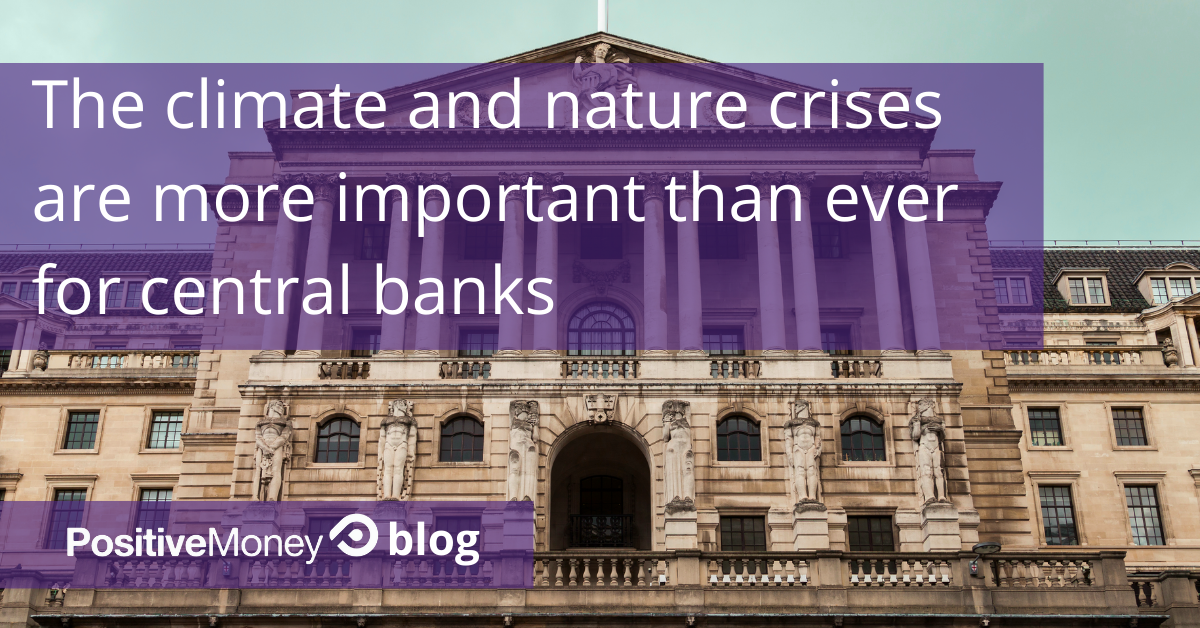
UKGlobal
27 January 2026
January 23, 2024
Criticisms of the Bank of England’s green mandate are built on flawed foundations. Here’s why the Bank is absolutely right to push ahead with its work on climate and nature.
The period of global inflation that began in 2021 and reached a peak in the UK in the autumn of 2022 has seen the Bank of England come under pressure from all sides.
At Positive Money, we rallied against the response of rapidly hiking interest rates. This is because interest rate rises can’t address the main driver of the inflation we’ve seen: our economy’s reliance on highly volatile fossil fuels. Rate hikes also have highly unequal impacts: they attempt to bring down inflation by reducing spending by the poorest and most indebted in society, whilst boosting the incomes of those with savings and the profits of the banking sector. Rate rises also have the added downside in making the investments needed for the green transition more expensive, because many green projects require a large amount of upfront investment, despite being cheaper in the long run than continuing to rely on fossil fuels for our economy to function.
Many mainstream economists and commentators, however, instead argued that the Bank of England was too slow to raise rates in response to inflation. This is based on the flawed theory that the inflation we’ve seen is due to a “wage-price spiral”, where prices are thought to be rising due to workers’ demanding higher wages.
Criticisms were also made by the former Bank of England Governor Lord Mervyn King, who argued that the Bank’s growing remit, including on climate change, distracts the Bank from its primary objectives for maintaining price and financial stability. A similar sentiment was made more recently in a Financial Times opinion piece from commentator Tony Yates, who argued that the green mandate serves to ‘delegate’ climate policy to the central bank, distracting from the ambitious government-led climate policy we need.
Positive Money, alongside many other organisations, campaigned for climate change to be included in the government’s mandate letter for the Bank – a campaign won in 2021 when the government’s target of reaching net zero was included in the Government’s letters to all of its key policymaking committees for the first time. This was an important step towards a greener Bank of England, signalling government support for ambitious action to steer financial flows that are driving the climate crisis away from harmful energy sources like fossil fuels, and towards green and sustainable industries. The argument that this conflicts with the Bank’s two primary objectives is fundamentally flawed, and only serves to benefit the vested interests in the financial sector who are profiting from fossil fuels, and want to prevent the regulatory power of the Bank of England from being used to green the financial system.
Of course, central bank policies alone are no silver bullet for the environmental crises. Governments must step up and lead the economic policy and investment required for a green transition, and halting the climate and ecological crises we face. But central banks still have a crucial role to play. The underlying causes of recent high inflation underscore how escalating environmental crises prevent central banks achieving their core objectives of price and financial stability. Central banks’ also hold powerful tools for guiding our economy towards the green transition. Criticisms that such concerns could be a ‘distraction’, misunderstand this, and fail to see the transformative potential of central banks’ in facilitating the flows of green finance needed to tackle the climate crisis.
Climate impacts pose profound risks to the stability of the financial system – systemic risks that it would be naive to presume individual financial firms will be able to manage themselves. The UK financial sector continues to pour money into new fossil fuels at an alarming rate despite the risk of these assets becoming worthless in the future, whilst relying on climate risk models that fundamentally cannot accurately translate the complexity of climate change into terms of financial risk. A safe climate is also a fundamental necessity for price stability. Our reliance on highly volatile fossil fuels leave us vulnerable to fossilflation, whilst at the same time, the impacts of climate change, such as on our food supply, are already causing climateflation.
The effects of these are only set to intensify. And while the Bank has done important work around climate change, it is far from leading the UK’s green transition, despite holding many of the powers to reorient financing at the scale and speed necessary. Within the Bank’s current toolkit, this could mean sending an important signal to the market by greening its collateral framework – the rules it sets for which assets it accepts as collateral in exchange for lending to financial institutions, which lies at the heart of our financial system.
Beyond actions the Bank can take alone, this ultimately requires us to recognise that the Bank of England is a public institution that should be working with the government in the public interest. Rather than acting in silos, we need better coordination between the Bank and the Treasury, akin to the credit guidance policies seen in much of the post-war “golden age”, to steer financing to green investment and ensure we are prepared to navigate future climate-induced shocks to the economy. The Bank’s green mandate is a vital first step in this direction.
For regular updates, you can sign-up to our mailing list or follow us on Twitter. You can also donate to support our work fighting for a money and banking system that enables a fair, sustainable and democratic economy.
